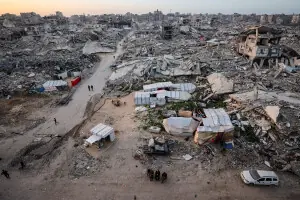Morocco earthquake death toll crosses 2,000, devastates historic sites
6 min readMoroccans on Sunday mourned the victims of a devastating earthquake that killed more than 2,000 people, as rescue teams raced to find survivors trapped in the rubble of flattened villages.
The strongest-ever quake to hit the country has killed at least 2,012 people and injured over 2,059, many of them critically, according to the latest official figures.
Friday’s 6.8-magnitude quake struck 72 kilometres (45 miles) southwest of the tourist hub of Marrakesh, wiping out entire villages in rural areas.
“I’ve lost everything”, said Lahcen, a resident of the mountain village of Moulay Brahim, whose wife and four children were killed.
Rescue workers recovered the bodies of Lahcen’s three daughters from the rubble of what was once their home, but have not yet found the bodies of his wife and son.
“I can’t do anything about it now, I just want to get away from the world and mourn.”
Troops and emergency services have scrambled to reach remote mountain villages where victims are still feared trapped.
Al-Haouz province, where the epicentre of the earthquake was located, suffered the most deaths with 1,293, followed by the province of Taroudant with 452.
The Red Cross warned that it could take years to repair the damage.
“It won’t be a matter of a week or two… We are counting on a response that will take months, if not years”, Hossam Elsharkawi, the organisation’s Middle East and North Africa director, said in a statement.
The village of Tafeghaghte, 60 kilometres southwest of Marrakesh, was almost entirely destroyed by the quake, the epicentre of which was only about 50 kilometres away, an AFP team reported, with very few buildings still standing.
“Three of my grandchildren and their mother are dead,” said 72-year-old Omar Benhanna. “They’re still under the debris. It wasn’t so long ago that we were playing together.”
Residents buried around 70 victims in the nearby cemetary on Saturday, as the funeral rites were punctuated by cries and screams.
In the evening, television channels broadcast aerial images showing entire villages of clay houses in the Al-Haouz region completely destroyed.
“The public authorities are still mobilised to speed up rescue operations and evacuate the injured”, the interior ministry said Saturday evening.
The tremor was also felt in the coastal cities of Rabat, Casablanca, Agadir and Essaouira, where many panicked residents took to the streets in the middle of the night, fearing that their homes would collapse. This earthquake is the deadliest in Morocco since the 1960 quake that destroyed Agadir, in which nearly 15,000 people, a third of the city’s population, died.
Strong tremors were also felt in the coastal cities of Rabat, Casablanca and Essaouira.
“I was nearly asleep when I heard the doors and the shutters banging,” said Ghannou Najem, a Casablanca resident in her 80s who was visiting Marrakesh when the quake hit.
“I went outside in a panic. I thought I was going to die alone.”
It is the strongest-ever quake to hit the North African kingdom, and one expert described it as the region’s “biggest in more than 120 years”.
“Where destructive earthquakes are rare, buildings are simply not constructed robustly enough… so many collapse, resulting in high casualties,” said Bill McGuire, professor emeritus at Britain’s University College London.
Interior ministry figures on Saturday showed the quake killed at least 1,037 people, the vast majority in Al-Haouz, the epicentre, and Taroudant provinces.
Another 1,204 people were injured, including 721 in a critical condition, the ministry said.
The ministry also recorded deaths in Ouarzazate, Chichaoua, Azilal and Youssoufia provinces, as well as in Marrakesh, Agadir and the Casablanca area.

‘Unbearable’ screams
Faisal Badour, an engineer, said he felt the quake three times in his building in Marrakesh.
“There are families who are still sleeping outside because we were so scared of the force of this earthquake,” he said. “The screaming and crying was unbearable.”
In Moulay Brahim village, in the mountains of Al-Haouz province near the quake’s epicentre, rescuers were searching for survivors in the rubble of collapsed houses, AFP correspondents reported.
On a nearby hill, residents began digging graves for the victims, the correspondents said.
Frenchman Michael Bizet, 43, who owns three traditional riad houses in Marrakesh’s old town, told AFP that he was in bed when the quake struck.
“I thought my bed was going to fly away. I went out into the street half-naked and immediately went to see my riads. It was total chaos, a real catastrophe, madness,” he said.
Footage on social media showed part of a minaret collapsed on Jemaa el-Fna square in the historic city.
An AFP correspondent saw hundreds of people flocking to the square to spend the night for fear of aftershocks, some with blankets while others slept on the ground.
Mimi Theobold, 25, a tourist from England, said she was with friends on a restaurant terrace when the tables began shaking and plates went flying.
Houda Outassaf, a local resident, said she was “still in shock” after feeling the earth shake beneath her feet – and losing relatives.
“I have at least 10 members of my family who died… I can hardly believe it, as I was with them no more than two days ago,” she said.
The interior ministry said authorities have “mobilised all the necessary resources to intervene and help the affected areas”.
The regional blood transfusion centre in Marrakesh called on residents to donate blood for those injured.
The army has set up a field hospital in Moulay Brahim and deployed “significant human and logistical resources” to support search and rescue efforts in Al-Haouz, state news agency MAP said.

Significant damage likely
“We heard screams at the time of the tremor,” a resident of Essaouira, 200 kilometres (125 miles) west of Marrakesh, told AFP. “Pieces of facades have fallen.”
The USGS PAGER system, which provides preliminary assessments on the impact of earthquakes, issued a “red alert” for economic losses, saying extensive damage is probable.
Foreign leaders expressed their condolences and many offered assistance, including Israel with which Morocco normalised relations in 2020.

US President Joe Biden said in a statement he was “deeply saddened by the loss of life and devastation”.
Chinese leader Xi Jinping expressed “deep grief for the victims” and hope that “the Moroccan government and people will be able to overcome the impact of this disaster”, according to Beijing’s state media.
Pope Francis expressed “his profound solidarity with those who are touched in the flesh and heart by this tragedy”.
The earthquake was also felt in neighbouring Algeria, where the Algerian Civil Defence said it had not caused any damage or casualties.
In 2004, at least 628 people were killed and 926 injured when a quake hit Al Hoceima in northeastern Morocco, and in 1960 a magnitude 6.7 quake in Agadir killed more than 12,000.
The 7.3-magnitude El Asnam earthquake in Algeria killed 2,500 people and left at least 300,000 homeless in 1980.
For the latest news, follow us on Twitter @Aaj_Urdu. We are also on Facebook, Instagram and YouTube.



























Comments are closed on this story.